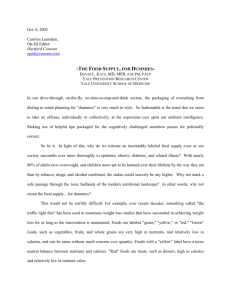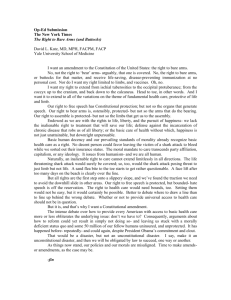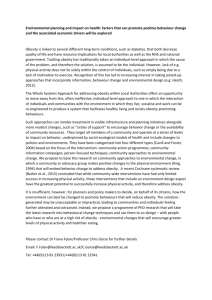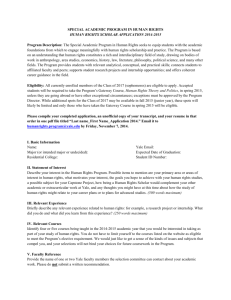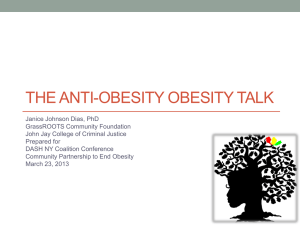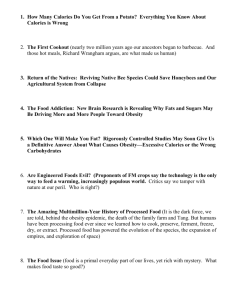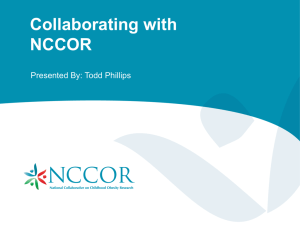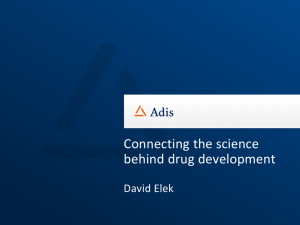October 14, 2003
advertisement
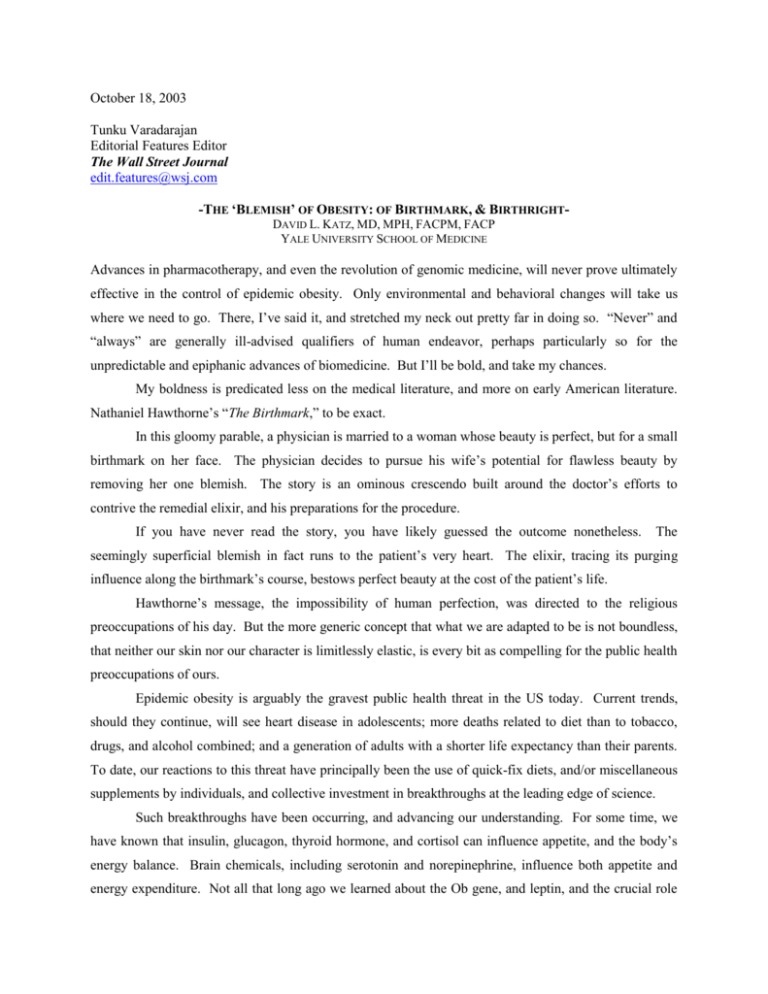
October 18, 2003 Tunku Varadarajan Editorial Features Editor The Wall Street Journal edit.features@wsj.com -THE ‘BLEMISH’ OF OBESITY: OF BIRTHMARK, & BIRTHRIGHTDAVID L. KATZ, MD, MPH, FACPM, FACP YALE UNIVERSITY SCHOOL OF MEDICINE Advances in pharmacotherapy, and even the revolution of genomic medicine, will never prove ultimately effective in the control of epidemic obesity. Only environmental and behavioral changes will take us where we need to go. There, I’ve said it, and stretched my neck out pretty far in doing so. “Never” and “always” are generally ill-advised qualifiers of human endeavor, perhaps particularly so for the unpredictable and epiphanic advances of biomedicine. But I’ll be bold, and take my chances. My boldness is predicated less on the medical literature, and more on early American literature. Nathaniel Hawthorne’s “The Birthmark,” to be exact. In this gloomy parable, a physician is married to a woman whose beauty is perfect, but for a small birthmark on her face. The physician decides to pursue his wife’s potential for flawless beauty by removing her one blemish. The story is an ominous crescendo built around the doctor’s efforts to contrive the remedial elixir, and his preparations for the procedure. If you have never read the story, you have likely guessed the outcome nonetheless. The seemingly superficial blemish in fact runs to the patient’s very heart. The elixir, tracing its purging influence along the birthmark’s course, bestows perfect beauty at the cost of the patient’s life. Hawthorne’s message, the impossibility of human perfection, was directed to the religious preoccupations of his day. But the more generic concept that what we are adapted to be is not boundless, that neither our skin nor our character is limitlessly elastic, is every bit as compelling for the public health preoccupations of ours. Epidemic obesity is arguably the gravest public health threat in the US today. Current trends, should they continue, will see heart disease in adolescents; more deaths related to diet than to tobacco, drugs, and alcohol combined; and a generation of adults with a shorter life expectancy than their parents. To date, our reactions to this threat have principally been the use of quick-fix diets, and/or miscellaneous supplements by individuals, and collective investment in breakthroughs at the leading edge of science. Such breakthroughs have been occurring, and advancing our understanding. For some time, we have known that insulin, glucagon, thyroid hormone, and cortisol can influence appetite, and the body’s energy balance. Brain chemicals, including serotonin and norepinephrine, influence both appetite and energy expenditure. Not all that long ago we learned about the Ob gene, and leptin, and the crucial role for this hormone in appetite regulation. We have since learned about Neuropeptide-Y, and PYY. Only quite recently have we identified the stomach hormone ghrelin, and begun to appreciate its importance. These insights have led many to conclude that we will one day package an obesity cure in a pill or syringe. They lead me to just the opposite conclusion. Obesity, or more correctly our susceptibility to it, is our birthmark. I rather doubt it can be medicated away with less than grave consequence. While energy balance and the control of weight is fundamentally simple-calories in versus calories out-the metabolic systems designed to safeguard our energy balance and prevent starvation are anything but. The more we learn about the genes, hormones, neurotransmitters, and other body chemicals involved in the regulation of our weight, the more apparent it becomes that this is no superficial blemish. Defense against starvation runs to our very core. And it is defense against starvation, not weight gain. Throughout all of human history, and the pre-human history before it, natural selection was engineering into us defenses against the prevailing threats. Among these were a demand for high levels of physical activity, and having barely enough to eat. We have no natural defenses against the hazard of dietary excess, because our ancestors knew nothing of it. Efforts to combat with medication our natural tendency to gain weight when low physical activity demands and an abundant calorie supply permit us to do so are efforts to dismantle the core of human metabolism. They will either fail, because they target an isolated component of an elaborate, overlapping, redundant array of defenses; or they will succeed in much the same way as Hawthorne’s elixir. To the extent that such predictions seem macabre and pessimistic, consider the plight of a polar bear struggling with the heat of the Sahara in summer. Now consider trying to fix the “problem” with medication, or a bit of tinkering with genes. We are no less adapted to our native habitat than polar bears to theirs, no less out of place in this modern world of vending machines, fast food, and video games than they on a sea of burning, shadeless sand. Viewed this way, the tantalizing promise of obesity solutions in the form of lotion, potion, or pill melts quickly away to nothing. The tendency to gain weight when the environment is permissive is our birthmark. An environment that is less permissive of weight gain has always, until now, been our birthright. Nothing in a pill will ever alter these fundamentals. Reconciling the environment to our native traits and tendencies, and empowering individuals to navigate around persistent environmental challenges are the only plausible means of curtailing the menace of obesity. We don’t need an elixir; we need to find our way home. -fin David L. Katz, MD, MPH, FACPM, FACP Associate Clinical Professor of Public Health & Medicine Yale University School of Medicine Author, “The Way to Eat,” Sourcebooks, Inc. 2002 (www.thewaytoeat.net) Correspondence: David L. Katz, MD, MPH; Director Yale Prevention Research Center 130 Division St. Derby, CT 06418 Phone: Work: (203) 732-1265 Home: (203) 288-2228 Fax: (203) 732-1264 Katzdl@pol.net; david.katz@yale.edu Administrative assistant: Jennifer Ballard: jennifer.ballard@yalegriffinprc.org David L. Katz, MD, MPH, FACPM, FACP is Associate Clinical Professor of Public Health & Medicine at the Yale University School of Medicine, and Director of the Yale Prevention Research Center. Nutrition columnist to ‘O,’ the Oprah Magazine, he is the author of 7 books to date, including a nutrition text widely used in medical education and the course text at both the Yale & Harvard Medical Schools, and “The Way to Eat” (Sourcebooks, Inc., 2002: www.thewaytoeat.net), which details the skills and strategies needed to overcome obstacles to nutritional health and lifelong weight control. His expert opinion on nutrition and obesity has been widely cited in the media. Most recently, he was featured in the October, 2003 issue of “Men’s Health” magazine, and the cover story for the October 20, 2003 issue of “TIME” magazine.
